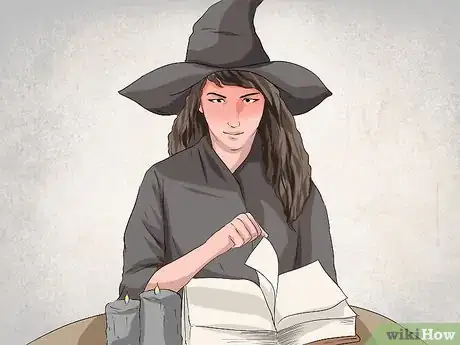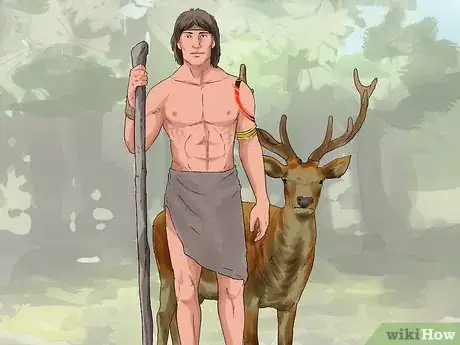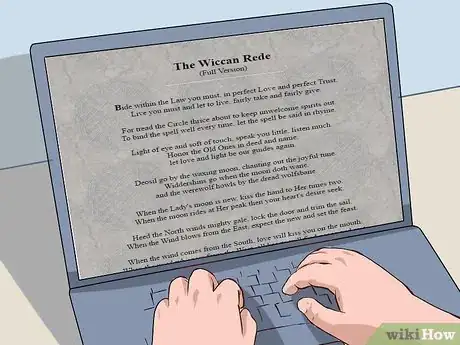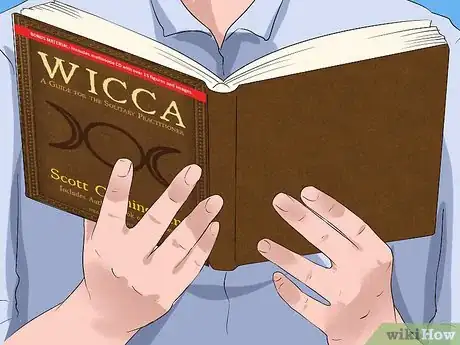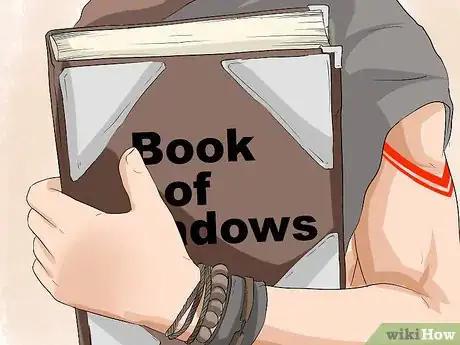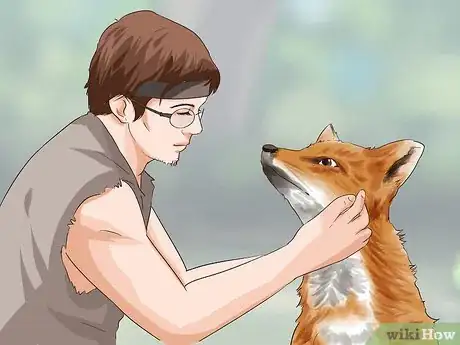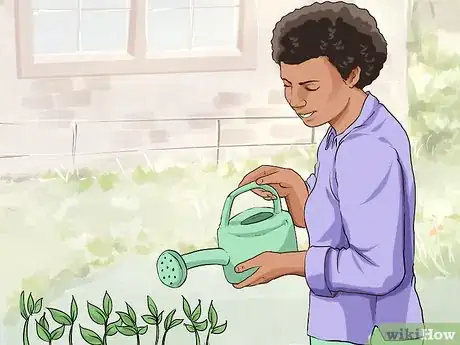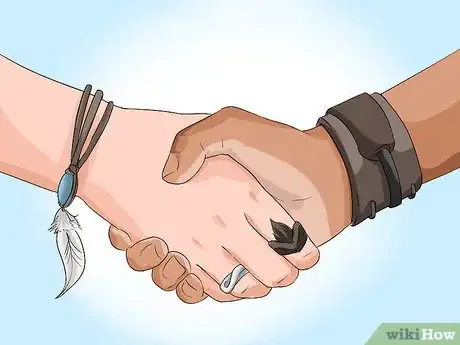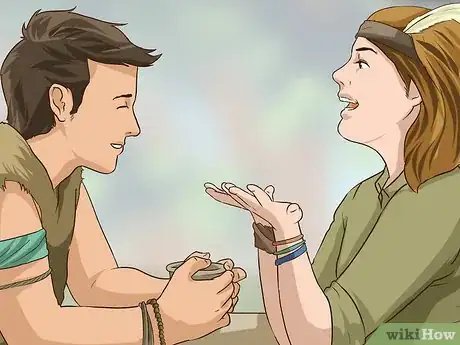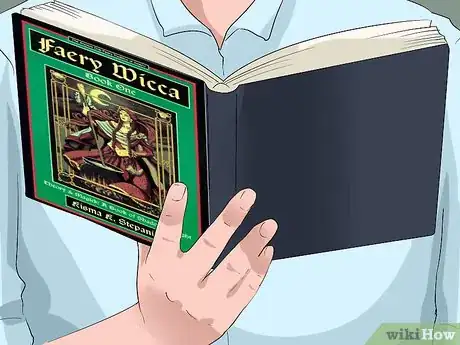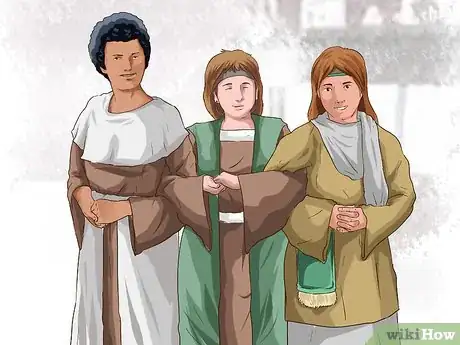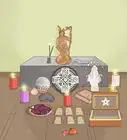This article was co-authored by wikiHow Staff. Our trained team of editors and researchers validate articles for accuracy and comprehensiveness. wikiHow's Content Management Team carefully monitors the work from our editorial staff to ensure that each article is backed by trusted research and meets our high quality standards.
There are 8 references cited in this article, which can be found at the bottom of the page.
wikiHow marks an article as reader-approved once it receives enough positive feedback. This article received 11 testimonials and 89% of readers who voted found it helpful, earning it our reader-approved status.
This article has been viewed 185,914 times.
Learn more...
The term Paganism refers to any non-Abrahamic religion that doesn’t have a central authority. There are many different Pagan traditions that are practiced all over the world. Wicca, also called Witchcraft, is a popular religion based on positive spell casting and worshiping a divine God and Goddess. Druidism is a diverse religion that celebrates and preserves nature. Reconstructionist traditions revive ancient pagan religions, such as worshipping the Norse gods.
Steps
Learning About the Types of Paganism
-
1Learn about Wiccan Paganism. Wiccans can also be called “Witches,” regardless of gender. (although do note that witchcraft and Wicca are not the same things) Wiccans are known for their reverence for nature, focus on spirituality, and spell casting. All Wiccan spells are positive by nature, as Wiccans don’t believe in casting hexes or curses. Wiccans are also known for:
- A belief in a divine Goddess and God
- The creation of charms and potions
- The ritual celebration of astrological events, such as the summer solstice
-
2Learn to identify Druidism. Druidism is a flexible form of Paganism that focuses on the divinity of nature. Druids commonly celebrate the changing of the seasons with rituals and believe that nature should be preserved at all costs. Additionally, many Druids believe in the existence of the Otherworld, a spiritual realm where your spirit rests before reincarnating.[1]
- Many Druids celebrate multiple religions. For example, it’s not uncommon to meet a Christian Druid, although many Pagan beliefs tend to be incompatible with monotheism.
Advertisement -
3Understand Reconstructionist Paganism. The term refers to contemporary revivals of Pagan religions, which often focus around a specific pantheon of deities, such as the Norse gods or the Greek gods. However, some polytheists may worship an eclectic range of deities, from many traditions. The main difference between the former groups is that while Druids focus on nature and Wiccans focus on magic, Polytheists focus on the gods. Reconstructionist religions include:
- Heathenry, a broad collection of Norse belief (such as Asatru, Vanatru, etc.)
- Hellenism, worship of the Greek gods
- Kemeticism, worship of the Egyptian gods
- Eclectic Polytheism, where one worships deities from more than one pantheon
- And many other traditions and paths, often based around a pantheon of deities.
Becoming a Wiccan
-
1Learn the Wiccan Rede. The Wiccan Rede is an ancient poem passed down through generations of Wiccans that details the spiritual ideals of Wiccans. This poem can be found online or on the first few pages of most Wiccan literature. There are two basic tenants: harm none, and the rule of threes.
- To “harm none,” avoid doing harm to other people, animals, nature, and yourself.
- The rule of threes refers to witchcraft and spiritual energy. Whatever you put out into the world, you receive threefold.
- Some Wiccans memorize the Wiccan Rede. However, many find this unnecessary and choose to internalize the teachings instead.
-
2Read modern Wiccan literature. There are many contemporary Wiccans that have written excellent books about becoming a practicing Wiccan. These books often include meditation tips, spells, and potion recipes. Additionally, reading a book about Wiccan practices will help you determine if Wiccan Paganism is right for you. Popular Wiccan books include:
- “Wicca: A Guide for the Solitary Practitioner” by Scott Cunningham
- “To Ride A Silver Broomstick: New Generation Witchcraft” by Silver RavenWolf
- “Power of the Witch: The Earth, the Moon, and the Magical Path to Enlightenment” by Laurie Cabot
-
3Join a coven. Covens are groups of witches that practice their craft together. Covens are great places for new Wiccans to learn about spell casting, meditation, and potion making. Find covens in your area by doing an online search or talking to an experienced Wiccan. However, you can also become an independent witch if you don’t like the idea of joining a coven.
- Many covens require any aspiring Wiccans to complete a training period before they can officially join. The training varies greatly between each coven.
- When looking for a coven, look for groups with a belief system that is similar to your own.[2]
-
4Perform a dedication ritual. If you join a coven, you will perform a dedication ritual when your training has finished. If you’re an independent witch, you can perform the ritual whenever you feel ready. Dedication rituals can be found in most Wiccan books and spell manuals.[3] You can also create your own dedication ritual. For example:
- Begin with a spoken promise to the God and Goddess to live ethically and “harm none.”
- Give the deities an offering, such as a glass of wine or a plate of food.
- Finish the ritual by performing ritual purification. For example, burn sage incense while you pray to the god and goddess.
-
5Create your Book of Shadows. Also called a Grimoire, this book is an integral part of your spiritual journey. You can either buy a large blank journal online or make your own book. If you buy a book, make sure you feel a sense of attachment to it before purchasing it. In this book you can record:
- Spells you’ve learned
- Rituals
- Notes about your spiritual journey
- Potion recipes[4]
-
6Cast spells and create potions. Spell and potion recipes can be found online or in published Wiccan literature. These spells are always positive in nature and usually call for healings and blessings. Hexes and curses are referred to as Dark Magic and are not performed by Wiccans. Examples of Wiccan magic include:
- A spell for fertility
- A potion for healing and good health
- A charm that brings wealth to the carrier
Becoming a Druid
-
1Understand the basic tenets. Druidism is a very flexible faith system that prides itself in a diversity of thought. However, all Druids believe in the divinity of nature and try to live in balance with the eco-system. Additionally, many Druids believe in reincarnation and in the existence of the Otherworld.
- The Otherworld is a spiritual realm where your soul rests before reincarnation.
- If you combine Druidism with another religion, you may not believe in the Otherworld. For example, a Christian Druid may not believe that the Otherworld exists.
-
2Find balance with nature. Druids believe that nature is inherently holy and should be preserved at all costs. Whenever possible, make an effort to limit your negative impact on the environment. You can practice living in harmony with the environment even if you live in a large city.[5] For example:
- Make an effort to recycle all plastic, glass, and metal that passes through your home.
- Live frugally to reduce the waste you produce.
- Grow a small garden in your home to show respect for nature.
-
3Read Druid literature. Many practicing Druids have written excellent books teaching others how to follow the Druid path. Reading these books will enhance your spiritual journey and give you an idea of whether or not Druidism is right for you. Some popular books on Druidism include:
- “Druidry and Meditation” by Nimue Brown
- “The Path of Druidry: Walking the Ancient Green Way” by Penny Billington
- The Druidry Handbook” by John Michael Greer
-
4Connect with other Druids. There are Druids living all over the world. Experienced Druids can offer advice that will help you along your spiritual journey. Less experienced Druids can offer companionship and insight into the Druid lifestyle.[6]
- Find other Druids online or by talking to an experienced Druid in your area.
-
5Participate in Druid holidays. There are eight Druidic holidays every year where one can celebrate the divinity of nature. During these times, many Druids attend large festivals with seasonal food and dancing. Other Druids enjoy holding small parties in their homes with their friends. There are no rules on how to enjoy these holidays. The Druidic holidays include:
- The summer and winter solstice (usually the 21st-22nd of June and the 21st-22nd of December)
- The spring and autumn equinoxes (usually the 21st-22nd of March and the 21st-22nd of September)
- General celebrations of the seasons that aren’t tied to any specific date[7]
Becoming a Reconstructionist
-
1Choose a tradition. The term Reconstructionist covers a variety of polytheistic religions. When choosing a tradition, you can either look for a religion that you feel an affinity for or practice the religion of your ancestors. Examples of Reconstructionist traditions include:
- Celtic Reconstructionism
- Heathenry (Norse Paganism)
- Hellenism (Greek Paganism)
- Kemeticism (Egyptian Paganism)
- Religio Romana (Roman Paganism)
- Rodnovery (Slavic Paganism)
-
1Learn about your tradition. Learn about your chosen tradition by talking to people that actively practice it. Do an online search to find forums or websites dedicated to connecting experienced practitioners with potential devotees. Additionally, read literature written for recent converts. For example:
- To learn about Hellenism, you could read “Kharis: Hellenic Polytheism Explored” by Sarah Kate Istra Winter.
- If you’re interested in worshipping ancient Nordic gods, read “Essential Asatru: Walking the Path of Norse Paganism” by Diana L. Paxson.
- Followers of any deity will benefit from "Devotional Polytheism: An Introduction" by Galina Krasskova.
-
2Practice your faith. You may create a shrine to your deities, recite prayers, and celebrate their rites and festivals. Much information can be found online, especially in the larger traditions, such as Heathenry and Hellenism. Theoi.com provides details about the Greek gods, as well as prayers one can use to worship them.
- If the surviving prayers don't work for you, you could write your own.
- You can also honor deities through their domains, such as gardening to honor an agricultural deity.
-
3Connect with other Polytheists in your tradition. Do an online search to find a community of Polytheists. If you can’t find one in your area, join an online group instead. Connecting with other Polytheists will allow you to make friends in the community and get advice throughout your spiritual journey.[9]
- There will likely be an active group within the country where your tradition originated. The Ásatrúarfélagið in Iceland is currently building a temple, and the Greek LABRYS celebrates ancient festivals in Athens.
Community Q&A
-
QuestionWhat is a good way to find one's patron god/goddess?
 Community AnswerTalk to a spiritual guide. For example, if you're a Druid, talk with an experienced Druid in your community. These people will be able to guide you down your spiritual path towards your patron deity. Alternatively, you could meditate and find your spiritual deity yourself. Remember, there are no wrong answers.
Community AnswerTalk to a spiritual guide. For example, if you're a Druid, talk with an experienced Druid in your community. These people will be able to guide you down your spiritual path towards your patron deity. Alternatively, you could meditate and find your spiritual deity yourself. Remember, there are no wrong answers. -
QuestionAre there any god/goddess that approve of sharing love with many people instead of being monogamous?
 Community AnswerMany Wiccans believe that the God and Goddess encourage love in all of its forms. However, be careful to "harm none." For example, if you cheat on your partner, you're harming them by breaking their trust. However, if you and your partner decide to have an open relationship, you're not harming anyone by sharing your love elsewhere because you're not breaking their trust.
Community AnswerMany Wiccans believe that the God and Goddess encourage love in all of its forms. However, be careful to "harm none." For example, if you cheat on your partner, you're harming them by breaking their trust. However, if you and your partner decide to have an open relationship, you're not harming anyone by sharing your love elsewhere because you're not breaking their trust. -
QuestionWhat tools do I need to practice a fulfilling life as a pagan?
 Community AnswerYou will typically need nothing more than than your heart, mind, and body. There are some tools that can help with ritual practice, such as an altar, a self crafted wand, or a cauldron. They are highly symbolic and serve as a visual representation of what you already have at hand.
Community AnswerYou will typically need nothing more than than your heart, mind, and body. There are some tools that can help with ritual practice, such as an altar, a self crafted wand, or a cauldron. They are highly symbolic and serve as a visual representation of what you already have at hand.
References
- ↑ http://www.druidry.org/druid-way/druid-beliefs
- ↑ http://www.mookychick.co.uk/health/spirituality/solitary_pagans_and_covens.php
- ↑ http://bluemoonwicca.org/initiation.html
- ↑ http://wiccanspells.info/learn-wicca-basics/how-to-create-your-own-book-of-shadows/
- ↑ https://druidnetwork.org/what-is-druidry/beliefs-and-definitions/articles/how-does-one-become-a-druid/
- ↑ https://druidnetwork.org/what-is-druidry/beliefs-and-definitions/articles/how-does-one-become-a-druid/
- ↑ http://www.druidry.org/druid-way/teaching-and-practice/druid-festivals
- ↑ http://www.paganspath.com/getstart.htm
- ↑ http://www.themonastery.org/guide-to-divinity/neopaganism
